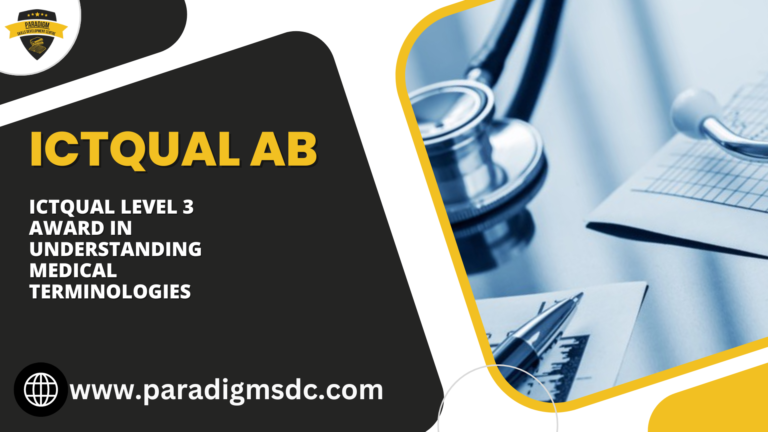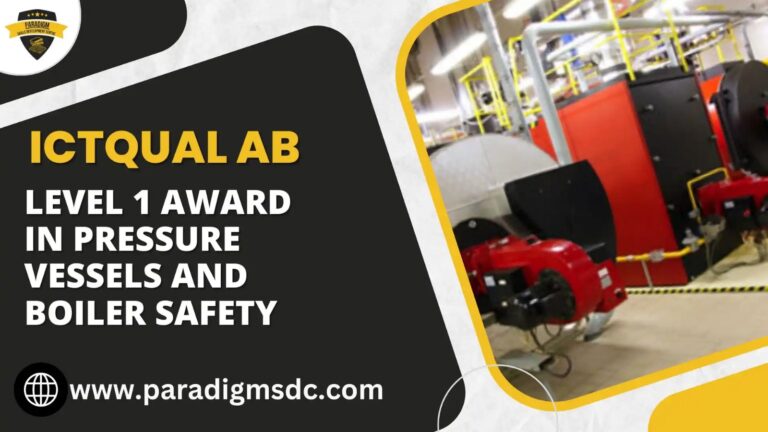Course Introduction
In today’s dynamic work environment, risk assessment is a critical component in maintaining safety and preventing accidents. The ICTQual Level 3 Award in Risk Assessment is designed to provide individuals with advanced knowledge and practical skills in identifying, evaluating, and controlling risks. This course is ideal for those who are responsible for conducting risk assessments in their workplace and wish to ensure a safe working environment.
Course Overview
The ICTQual Level 3 Award in Risk Assessment is an in-depth program that equips participants with the expertise needed to conduct comprehensive risk assessments. This course combines theoretical knowledge with practical applications, ensuring that learners can apply what they have learned to real-world situations effectively.
Course Study Units
The course is structured into several detailed units, each focusing on essential aspects of risk assessment:
- Introduction to Risk Assessment
- Legal and Regulatory Frameworks
- Risk Identification
- Risk Evaluation and Analysis
- Risk Control Measures
- Risk Communication and Documentation
- Review and Continuous Improvement
Learning Outcomes
Upon completing the ICTQual Level 3 Award in Risk Assessment, participants will be able to:
Introduction to Risk Assessment
- Understand the Concept of Risk Assessment: Learners will be able to define risk assessment and explain its significance in various contexts.
- Identify the Benefits of Risk Assessment: Learners will recognize the benefits of conducting risk assessments, such as enhancing safety and ensuring compliance.
- Differentiate Between Hazards and Risks: Learners will be able to distinguish between a hazard (a potential source of harm) and risk (the likelihood and consequence of that harm occurring).
Legal and Regulatory Frameworks
- Comprehend Relevant Legislation and Regulations: Learners will understand the key legal requirements related to risk assessment in their jurisdiction.
- Identify Stakeholder Responsibilities: Learners will be able to outline the roles and responsibilities of employers, employees, and other stakeholders in managing risks.
- Ensure Compliance with Standards: Learners will be able to apply relevant legal and regulatory standards to risk assessment processes.
Risk Identification
- Identify Various Hazards: Learners will be capable of identifying different types of hazards, including physical, chemical, biological, ergonomic, and psychosocial.
- Use Hazard Identification Techniques: Learners will be proficient in techniques for identifying hazards, such as workplace inspections, checklists, and employee consultations.
- Recognize Context-Specific Risks: Learners will be able to identify risks specific to various environments and operational contexts.
Risk Evaluation and Analysis
- Assess Risk Likelihood and Severity: Learners will be able to evaluate the likelihood and potential severity of identified risks.
- Apply Risk Analysis Techniques: Learners will be proficient in quantitative and qualitative risk analysis methods, including risk matrices and fault tree analysis.
- Prioritize Risks for Action: Learners will be able to prioritize risks based on their evaluation to determine which require immediate attention.
Risk Control Measures
- Understand Hierarchy of Control: Learners will comprehend the hierarchy of risk control measures, from elimination to personal protective equipment (PPE).
- Develop and Implement Control Measures: Learners will be capable of selecting and implementing appropriate control measures to mitigate identified risks.
- Evaluate Effectiveness of Controls: Learners will be able to assess the effectiveness of implemented control measures and make adjustments as necessary.
Risk Communication and Documentation
- Communicate Risk Information Effectively: Learners will be able to convey risk-related information clearly and effectively to relevant stakeholders.
- Document Risk Assessments: Learners will be proficient in documenting risk assessments, including the findings, control measures, and review processes.
- Maintain Records for Compliance: Learners will understand the importance of maintaining accurate records to demonstrate compliance with legal and regulatory requirements.
Review and Continuous Improvement
- Conduct Regular Reviews: Learners will be able to conduct regular reviews of risk assessments to ensure they remain current and effective.
- Identify Opportunities for Improvement: Learners will be able to identify and implement improvements in the risk assessment process based on review findings and feedback.
- Foster a Culture of Continuous Improvement: Learners will understand the importance of continuous improvement in enhancing overall risk management and organizational resilience.
Course Benefits
- Enhanced Expertise: Gain advanced knowledge and skills in risk assessment.
- Regulatory Compliance: Ensure your workplace meets legal risk assessment requirements.
- Improved Safety: Contribute to a safer working environment by identifying and controlling risks.
- Career Advancement: Enhance your professional qualifications and open up new career opportunities.
- Practical Skills: Apply what you learn through practical exercises and case studies.
Who is this Course For?
This course is ideal for:
- Health and safety professionals looking to advance their skills.
- Managers and supervisors responsible for conducting risk assessments.
- Employees tasked with workplace safety and risk management.
- Individuals seeking to specialize in risk assessment and safety management.
- Employers aiming to improve their organizational safety standards.
Future Progression
The ICTQual Level 3 Award in Risk Assessment serves as a foundation for further qualifications and career development in health and safety. After completing this course, participants can progress to higher-level certifications, such as:
- ICTQual Level 4 Award in Health and Safety
- NEBOSH (National Examination Board in Occupational Safety and Health) Certificate or Diploma
- IOSH (Institution of Occupational Safety and Health) Managing Safely or Leading Safely
- Advanced Diplomas in Occupational Health and Safety
These advanced qualifications pave the way for roles in health and safety management, consultancy, and specialized risk assessment positions.
Conclusion
The ICTQual Level 3 Award in Risk Assessment is a crucial course for anyone responsible for ensuring workplace safety. By completing this course, you will not only enhance your risk assessment skills but also contribute to creating a safer and more compliant work environment. Whether you are looking to advance your career or improve your workplace’s safety standards, this course offers the comprehensive knowledge and practical skills you need to succeed.







